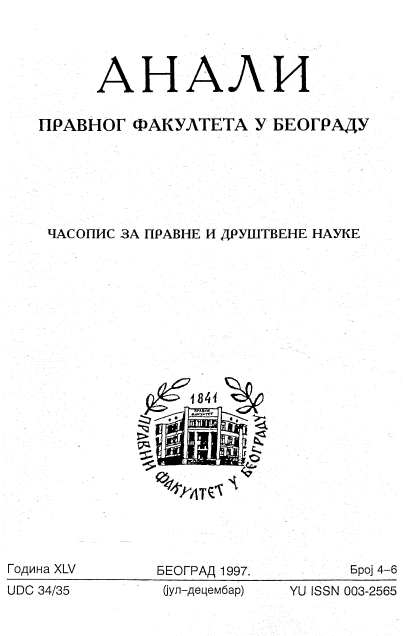КАНТОВО САГЛЕДАВАЊЕ ПОВЕЗАНОСТИ ПРАВА С ДРЖАВОМ - Поводом два века списа Metaphysik der Sitten
KANT'S VIEW ON THE CONNECTION OF LAW WITH THE STATE
Author(s): Stevan K. VračarSubject(s): Philosophy of Law
Published by: Правни факултет Универзитета у Београду
Keywords: Immanuel Kant; The Philosophy of Law; The Philosophy of the State; The Connection of the State and Law
Summary/Abstract: On the occasion of the bicentennial of the essay by Immanuel Kant, Metaphysik der Sitten (1797), the author endeavours to demonstrate as fully as possible the logical basis for his postulate that, in addition to so many others, this great philosopher also explained the crucial idea of the inseparable connection of law with the state. In the first part of his study, he underlines that so far this has not been sufficiently noted or researched. The author believes that various circumstances need to be examined: the social habitus, the real situation and the prospects of law and the state as Kant saw it, the unity and integrity of Kant's philosophical system, the structure of the essay, the complex statement of reasons, the influence of the researcher's views, the validity of the interpretations given on the whole essay, individual segments and, of course, the examined and interpreted statements by Kant in this and other essays. Accordingly, the author in the second part of the study interprets Kant's view of law and the state. Pointing to the basic features of Kant's philosophy, as well as Kant's corresponding postulates on society and man, on the freedom of the individual, the author stresses the importance of social nonns, particularly moral rules and, above all, the so-called categorical imperative. Thus, a distinction is made primarily between moral and legal nonns leading to Kant's definition of law which, according to the author, is no "better" or "clearer" than many others. On the contrary, each and every word and the entire formulation require an adequate understanding of the weight Kant gives to each tenn he uses. Otherwise, regarding Kant's notion of the state, it is characteristic that he did not define it as rigorously as the notion of law, but one can reconstruct it with the help of the most important quotations. Thus, Kant's apoproach has also enabled an explanation of the origin of law and the state, in the spirit of a kind of contractualism. Within the scope of such ideas, Kant also developed the conception of justice as the fundamental value. In this respect the elements of the connection of law with the state are important: they are the parts of law (public and private, internal and international etc.). On the other hand, in his treatment of the state, Kant emphasised the significance of the division of power, the prerequisites for the functioning of the legal state, a democratic regime, the advantages of a republic and suchlike. But, he did not accept the theses on the so-called right to resistence, he stressed the advantages of reform over revolutionary turmoil. Ultimately, Kant stressed the idea of the interrelation of law with the state, which particularly confirms the principle of legality. And more than that: Kant perceived the far-reaching effects of modem constitutionality, as a condition and confirmation of the modem political community. In this connection, the author particularly emphasises S 45 as a brilliant expression of that idea, which was otherwise almost unnoticed even in well-known analyses. In the third part of his paper, the author points to the difference between Kant's time and our own, to that which has so far been said, and also to what has not been sufficiently examined in the commentaries regarding this significant work. According to the author, this is seen precisely on the example of the outstandingly important idea on the essential connection of law with the state. The paper is intended to mark the bicentennial of Kant's essay The Metaphysik der Sitten (1997), striving to analytically and arguably reveal one of the Kantian key ideas - in the author's view - in this famous essay. It is the idea of unification and the interrelationship of law with the state, which has its foundation and testimony in reality, but also the great significance for conceiving modem theories, the philosophical and political frameworks of a conception which the author has developed in his previous discourses and articles over several decades.
Journal: Анали Правног факултета у Београду
- Issue Year: 45/1997
- Issue No: 4-6
- Page Range: 325-353
- Page Count: 29
- Language: Serbian

